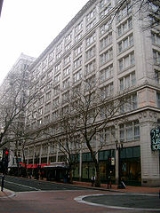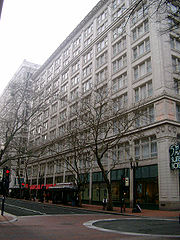
Lipmans
Encyclopedia

Department store
A department store is a retail establishment which satisfies a wide range of the consumer's personal and residential durable goods product needs; and at the same time offering the consumer a choice of multiple merchandise lines, at variable price points, in all product categories...
chain based in Portland, Oregon
Portland, Oregon
Portland is a city located in the Pacific Northwest, near the confluence of the Willamette and Columbia rivers in the U.S. state of Oregon. As of the 2010 Census, it had a population of 583,776, making it the 29th most populous city in the United States...
. The company was originally known as Lipman-Wolfe & Company, named after the two founding partners, Adolphe Wolfe and his uncle, Soloman Lipman. It is now defunct.
History
In 1850, Lipman and Wolfe formed a partnership in Sacramento, CaliforniaSacramento, California
Sacramento is the capital city of the U.S. state of California and the county seat of Sacramento County. It is located at the confluence of the Sacramento River and the American River in the northern portion of California's expansive Central Valley. With a population of 466,488 at the 2010 census,...
during the California Gold Rush
California Gold Rush
The California Gold Rush began on January 24, 1848, when gold was found by James W. Marshall at Sutter's Mill in Coloma, California. The first to hear confirmed information of the gold rush were the people in Oregon, the Sandwich Islands , and Latin America, who were the first to start flocking to...
. They became prosperous merchants, expanding into Nevada during the great silver rushes. The later decline of the Comstock Lode
Comstock Lode
The Comstock Lode was the first major U.S. discovery of silver ore, located under what is now Virginia City, Nevada, on the eastern slope of Mount Davidson, a peak in the Virginia Range. After the discovery was made public in 1859, prospectors rushed to the area and scrambled to stake their claims...
impacted the business, prompting Wolfe to move to Portland in 1880.
Wolfe opened a new store in Portland, re-establishing his business. Floods and space limitations forced the store to move three times, the last of which was in 1912, when the flagship store was opened at Fifth and Washington Streets. The new store was just across the street from Meier & Frank
Meier & Frank
Meier & Frank was a chain of department stores founded in Portland, Oregon, and later bought out by the May Department Stores Company. Meier & Frank operated in the Pacific Northwest from 1857 to 2006.-History:Summary...
's flagship store, sparking an intense rivalry.
Lipman's was well-known locally for establishing several "firsts" in Portland retail history:
- The first use of an elevatorElevatorAn elevator is a type of vertical transport equipment that efficiently moves people or goods between floors of a building, vessel or other structures...
system in a department store. - The first retailer to mark set prices on merchandise, eliminating haggling and the fashion code price system.
- The first retailer to make change down to the penny instead of nickel.
By the end of its identity, the Lipman's brand had grown into a chain of six stores. Adolphe Wolfe died in 1938, passing the company on to his nephew. In the 1950s, the Wolfe family sold Lipman's to the Dayton Hudson Company, which kept the Lipman's brand as a division. Lipman's began to lose market share to Meier & Frank in the 1970s, when Marshall Field's
Marshall Field's
Marshall Field & Company was a department store in Chicago, Illinois that grew to become a major chain before being acquired by Macy's Inc...
bought all six stores in 1979. All were rebranded as Frederick & Nelson
Frederick & Nelson
Frederick & Nelson was a department store chain in the northwestern United States, based in Seattle, Washington. Founded in 1891 as a furniture store, it later expanded to sell other types of merchandise. The company was acquired by Marshall Field & Company in 1929...
in early April of that year. In 1986, these stores, except for the downtown store which was closed, were re-branded as Crescent Outlets from The Crescent
The Crescent
The Crescent was a small chain of department store founded and based in Spokane, Washington. Once a subsidiary of Marshall Field & Company, the chain was sold to BATUS Retail Group in 1982. BATUS renamed the stores Frederick & Nelson, the company's Seattle, Washington division, in 1988. Frederick...
Chain based in Spokane and Owned by Frederick & Nelson. They were purchased by Lamonts
Lamonts
Lamonts was a chain of department stores founded in Seattle, Washington. The chain was started in 1970 when Pay 'n Save renamed its suburban branches of Rhodes, a department store chain the company acquired in 1965. Lamonts remained a division of Pay 'n Save until 1985...
in 1988.
Brief resurrection
In early 1987, F&N Acquisition Corp., the owners of Frederick's announced that they would bring back the Lipman's name as an off-price retail division. Five Frederick & Nelson stores in Oregon and four Great Clothes Outlets in Washington were to be renamed Lipman's, but the Oregon locations instead were sold to The CrescentThe Crescent
The Crescent was a small chain of department store founded and based in Spokane, Washington. Once a subsidiary of Marshall Field & Company, the chain was sold to BATUS Retail Group in 1982. BATUS renamed the stores Frederick & Nelson, the company's Seattle, Washington division, in 1988. Frederick...
. These stores were slightly smaller in size than normal stores and catered to "fashion-conscious 20- to 40-year-olds with money to spend on career and casual wardrobes". The division was meant to compete directly with Nordstrom
Nordstrom
Nordstrom, Inc. is an upscale department store chain in the United States, founded by John W. Nordstrom and Carl F. Wallin. Initially a shoe retailer, the company today also sells clothing, accessories, handbags, jewelry, cosmetics, fragrances, and in some locations, home furnishings...
along with complementing its sister store. By January 1988, sales at the stores fell short of the $125-per-square-foot target. Ownership was handed over to F&N executives and all the stores became Frederick & Nelson Red Tag Clearance Centers by mid-1988. All these stores were closed during 1990 cutbacks.
Cinnamon Bear
Lipman's is probably best remembered for the Cinnamon BearThe Cinnamon Bear
The Cinnamon Bear is an old time radio program produced by Transco , based in Hollywood, California. The series was specifically designed to be listened to six days a week between Thanksgiving and Christmas....
, a popular Portland Christmas
Christmas
Christmas or Christmas Day is an annual holiday generally celebrated on December 25 by billions of people around the world. It is a Christian feast that commemorates the birth of Jesus Christ, liturgically closing the Advent season and initiating the season of Christmastide, which lasts twelve days...
time tradition since 1937. The Cinnamon Bear was introduced as a Lipman's-sponsored radio story character, meant to count down the days until Christmas. Along with Santa Claus
Santa Claus
Santa Claus is a folklore figure in various cultures who distributes gifts to children, normally on Christmas Eve. Each name is a variation of Saint Nicholas, but refers to Santa Claus...
, his costumed likeness appeared every Christmas at Lipman's stores, handing out cookies to children. Frederick & Nelson continued the practice after absorbing the brand. The Cinnamon Bear survives today as a souvenir at the Fifth Avenue Suites. To this day, the Cinnamon Bear is aired during the holidays on K103
KKCW
KKCW is a commercial broadcast radio station licensed to Beaverton, Oregon and serves the greater Portland metropolitan area. The transmitter is located in Portland's west hills. The station's format is adult contemporary music. KKCW airs Christmas music from mid-November through Christmas...
. The Cinnamon Bear radio show can also be heard on Kool 99.1 in Eugene, Oregon every Christmas
Portland flagship store reuse
Frederick & Nelson closed the former Lipman's flagship store during a reorganization of the chain in 1986. The building was listed in the National Register of Historic PlacesNational Register of Historic Places
The National Register of Historic Places is the United States government's official list of districts, sites, buildings, structures, and objects deemed worthy of preservation...
, as the Lipman–Wolfe and Company Building
Lipman–Wolfe and Company Building
The Lipman–Wolfe and Company Building is a building located in downtown Portland, Oregon, listed on the National Register of Historic Places.-See also:* Lipman Wolfe & Company* National Register of Historic Places listings in Southwest Portland, Oregon...
, in 1988.
In 1996, after extensive renovation, the ten-story, half-block building reopened as the Fifth Avenue Suites, a 222-room hotel. In 2007, the Fifth Avenue Suites was renamed the Hotel Monaco.
External links
- Lipman's at PDXhistory.com, Mark Moore's page on Lipman-Wolfe & Company
- Fifth Avenue Suites Portland, history of the building
- "Lessons from the past", 2005 article comparing the Lipman building reuse to a similar plan for the nearby Meier & Frank Building from Portland TribunePortland TribuneThe Portland Tribune is a free weekly newspaper published each Thursday in Portland, Oregon, United States.The Tribune is part of the Pamplin Media Group, which publishes a number of community newspapers in the Portland metropolitan area, and also owns and operates the talk radio station KPAM, and...
- 1956 photograph of Lipman Wolfe & Co. store in Salem from Salem Public Library

